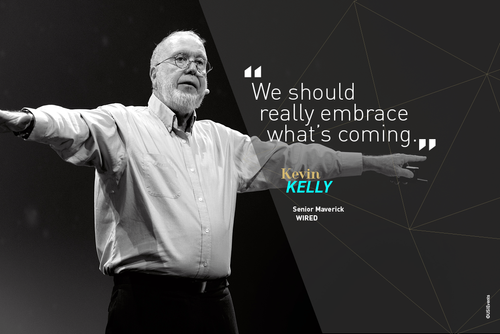Kevin Kelly - Inevitable disruption
“Artificial intelligence is already at work everywhere today, but we can’t see it yet because we assimilate it to our current systems and mechanisms.” For Kevin Kelly, co-founder and executive editor of Wired since 1992, the combination between new technologies and human intelligence is nonetheless the driver of twelve ‘inevitable’ trends.
Far from being pessimistic, for him it opens up immense opportunities in terms of knowledge, experience and infrastructure. Although it is difficult to take a step back to understand ongoing trends, people 50 years in the future could say that 2017 was the year that it all began. He presents three of the dozen trends which will be at work for the next 30 years, taken from his indispensable book The Inevitable.
Cognifying: AI as a new commodity
For Kevin Kelly, our human intelligence has a very poor understanding of what intelligence is. We tend to think of intelligence as a single dimension, with intermediate levels between low IQ on one end and super intelligence on the other. However in his view, intelligence is made up of several dimensions which intertwine and vary across species, much more like a “symphony of different notes”: “animals may have a smaller set of competences than humans, but some of their competences are much more developed than ours: squirrels can distinguish between thousands of types of nuts, we can only remember a few”. The strength of artificial intelligence is that it is capable of combining, comprehending and deploying such clusters of intelligence far beyond what current science is able to imagine. In terms of memory, Google Search is already far ahead of humans, because the search engine can record, recognize and retrieve the words making up 16 billion Web pages. If machines are currently able to equal human intelligence in some of these competences (arithmetic, image recognition, etc.), soon they will exceed us by combining human competences (language, spatial awareness, emotional intelligence, etc.) with artificial competences.
Every year human driving causes a million deaths, connected cars would reduce this risk to close to zero because “the computers in the cars won’t have human awareness, and human awareness clearly favors distractions”. The usefulness of artificial intelligence lies in its potential as a commodity which will soon be available on demand on any device. Like electricity which, starting from the 1920s, made it possible to automate mechanical power, artificial intelligence will make it possible tomorrow to “cognify” our existing systems. Contrary to popular belief, artificial intelligence will be a source of empathy, with screens reacting and responding to our smiles, gestures and moods. AI will not completely replace humans but will instead manage tasks which involve efficiency and productivity, which will build on human research and creativity.

Interacting: the ultimate link in the value chain
Advisor to Steven Spielberg for Minority Report, very early on Kevin Kelly anticipated how new technologies would enable us to multiply our capacity for interactions, by detecting our emotions and intentions through our gestures and facial expressions. For him, “our body will be our own password” and it will be much easier to communicate with our environment. Thus virtual reality and mixed reality will occupy a specific place in our space-time by bolstering different ways to interact. Mixed (or augmented) reality thereby adds the virtual to the real universe when virtual reality offers a complete immersion experience. In a world where screens are everywhere, mixed reality thus multiplies the number of screens which we can integrate in virtual reality to interact with avatars. Kevin Kelly considers that it will be the new platform after smartphones, as VR offers unique infrastructure to develop the ultimate link in the value chain: experiences around products and services, which opens up a whole new economic field.
Sharing: data as the foundation of the new economy
While most people associate the sharing economy with players such as Uber, few associate it with what could be considered the “new oil”: data sharing. Data is nonetheless at the heart of a new economy which is completely reshuffling the deck. While Ford is valued at 44 billion dollars on the stock market with over 100 million cars on the road, Tesla, with only 200,000 cars on the road is worth more than 51 billion dollars. The major difference between the two is that Ford has no data on its cars whereas Tesla can analyze over 1,300,000 miles driven. Sharing and leveraging these data constitute the foundation for a new infrastructure because although innovation is the true driver of the economy, it has no value if it is not adopted by a large network and associated communities. Like Facebook and its 2 billion users, business opportunities will surely derive from the hybridization of a variety of technologies. Kevin Kelly concludes with his usual enthusiasm: “We live in exciting times, and the most important things have not yet been invented. You are not too late! ” Reassuring and terribly stimulating!
